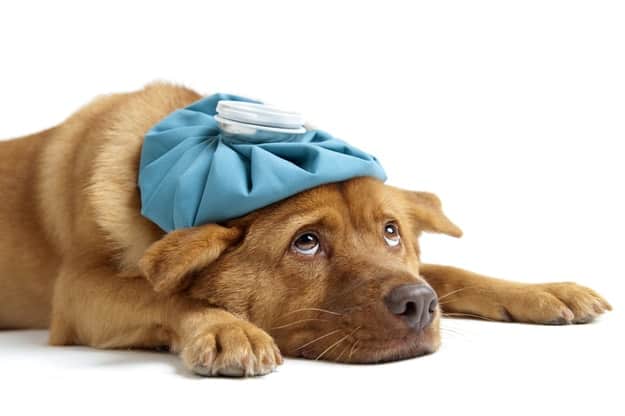Symptoms, Causes, and Treatment of Diarrhea in Dogs
Diarrhea consists of the abnormally frequent passage of loose or soft stools, and is one of the most common signs of disease in dogs. It occurs when dissolved substances within the intestine cause excess water to move into the intestine. This accumulation decreases the absorption of food and results in what vets call Malapsorptive Diarrhea. On the other hand, an increased secretion of electrolytes into the intestine causes diarrhea due to Maldigestion. Diarrhea lasting less than 24 hours without signs of illness can be beneficial. It is the body’s defense mechanism to cleanse itself. Diarrhea lasting over 24 hours, with or without signs of illness, should be addressed by your veterinarian.
SYMPTOMS
* Loose or soft stool passed often.
* Stool coated with mucus.
* Stool containing blood.
* Loss of appetite.
* Lethargic, depressed.
CAUSES
* The leading cause of diarrhea in dogs is dietary indiscretion (eating table scraps, garbage, foreign objects).
* Stress and anxiety can cause stool to be loose with mucus and/or blood.
* Bacteria Diseases: Salmonella; Viral Diseases: Parvo and Corona Virus.
* Parasites, Roundworms especially in puppies.
* Allergies: Intolerance to milk; occasionally food.
WHAT YOU CAN DO
Feed small, bland, low-fat, easily digestible meals four times daily. Use lean protein, such as poultry or fish. On day one, withhold food but give fluids to prevent dehydration. On the second day feed several small bland meals, pureed chicken, turkey or beef are well tolerated. Add yogurt with live acidophilus cultures to help replace the bacteria lost with diarrhea. The bacteria are necessary for proper digestion and absorption of food. On the third day add fiber in the form of vegetables, like squash or pumpkin, to the diet. Fiber acts like a sponge and draws water out of stool which helps to make it firm. On the fourth day add grains like white rice and on day five change from white rice to brown rice. Rice is a carbohydrate and provides energy. Finally, start adding your dog’s normal diet into this at one-quarter increments until your dog is back on his normal diet.
* A complete physical examination along with an accurate history help determine the problem. For example, note when the diarrhea began, how often it occurs, and if your dog is straining. Bring a stool sample and note whether or not your dog ate anything unusual. A fecal exam checks for worms, most of which can only be seen under the microscope. Only severely parasitized animals excrete live worms in their stool. Worms are an important cause of diarrhea in puppies and adult dogs.
* Diagnostics for long-term and/or recurrent cases of diarrhea may include blood tests to rule out bacterial and viral problems and detect disease of major organ systems like the liver or kidneys. X-rays to find offensive objects and abnormal growths; interpretation of fecal cultures to reveal specific bacteria like salmonella; and intestinal biopsies.
PARVOVIRUS
* Parvovirus is the number one fatal infectious disease of unvaccinated puppies and adult dogs. It is now manageable through vaccination. The virus is very contagious and is spread by contact with infected feces. Parvovirus attacks the lining of the intestinal tract and the heart of young puppies. Hallmark signs of parvovirus include vomiting and diarrhea with or without blood.
* Prompt veterinary treatment is essential in cases with persistent diarrhea, especially puppies that are not vaccinated. Diarrhea results in dehydration from the fluids lost in the feces. Fluids can be given by mouth as long as vomiting is not also a problem. Fluids may be given under the skin or through a catheter inserted into a vein in more critical cases. Severe dehydration left untreated may lead to shock, collapse and even death.
COMPLEMENTARY TREATMENTS
HERBAL REMEDIES
To control diarrhea: Remedy #1: Add two acidophilus capsules to each meal until the stool is firm. Remedy #2: Mix one half cup of finely chopped sage leaves with two finely crushed cloves of garlic. Add one tablespoon of honey and roll into small balls. Offer these three times a day: one for small dogs or two to four for larger dogs. Remedy #3: Activated charcoal, available in pharmacies, helps absorb toxins and poisons. Dissolve up to three tablets in water depending on the size of your dog and offer them to your dog to drink. Don’t use for more than two days because excess amounts of charcoal can adversely affect absorption.
HOMEOPATHIC REMEDIES
For small, frequent bowel movements try Arsenicum album 6c (arsenic trioxide): one pellet every four hours for three treatments. Withhold food 10 minutes before and after treatment.










Isn’t garlic toxic to dogs? That’s what my vet told us.
A little garlic will not harm your dog. Feeding a whole clove of garlic is a different story.